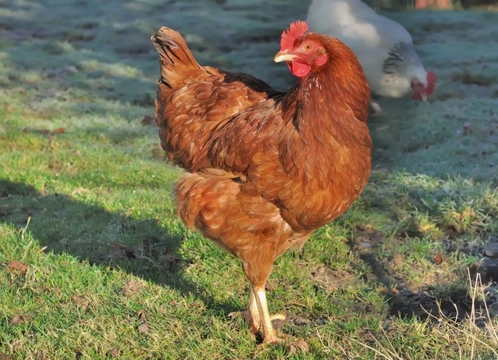
Share:
Eighteen interesting facts about chickens
Many people aspire to keeping a few chickens in their garden or smallholding, and enjoying the benefits of a supply of fresh eggs on demand! People that do keep chickens are all too aware that each bird has their own unique personality and set of behaviours, ranging from a best friend to a favourite place to roost for the night.
Whether you already keep chickens or are at the research stages of looking into whether poultry keeping might be an option for you, this article will share eighteen fun and interesting facts about chickens that you might not already be aware of. Read on to find out more!
- Chickens have a great memory for faces; studies have shown that chickens can recognise and differentiate between around a hundred other individual chickens! They can also tell the difference between human faces, and will soon recognise the people who care for them and feed them!
- When chickens sleep, they go through the same sleep stages as us, including REM or rapid eye movement sleep, which indicates that the chicken is dreaming!
- The various different types of chickens that are commonly kept in the UK today are all descended from selectively bred wildfowl from the jungles of Asia.
- The term “pecking order” comes from the observation of chickens, and reflects the fact that chickens have clear social hierarchies when kept together, ranging from the most dominant bird at the top of the pile, down through the ranks to the most subservient!
- Hens choose to feed close to the cockerel that they live with, as the cockerel will defend his hens from predators.
- The verbal language of chickens is quite complex, consisting of over thirty different types of calls and vocalisations that can be used for all sorts of things, from telling other chickens where the food is to alerting the pack to the presence of a predator or threat.
- Chickens even have different types of vocalisations to let the other birds know about different types of predators, which tells the other birds whether to come and join the fight, or to run for their lives!
- Hens are excellent mothers, which care deeply for their chicks and protect and nurture them until they are old enough to fend for themselves. This is where the phrase “mother hen” comes from!
- Birds of all types are distant descendants of the dinosaurs that roamed the earth long before human habitation, and the chicken is in fact the closest living relative to the extinct Tyrannosaurus Rex!
- Chickens don’t have a taste bud that allows them to detect sweet foods, which is just as well as chocolate is highly toxic to birds! Chickens can, however, detect the taste of salt, and generally don’t like it.
- Chickens have a better understanding of missing objects and resources than human toddlers; they know that once an object is removed from their sight, that the object still exists and is somewhere else. Toddlers are not able to do this!
- Chickens might seem to always be on the hunt for food, but they are actually quite picky about what they eat. Under test conditions, mother hens have been shown to teach their chicks to avoid certain types of grains that are actually bad for them.
- The colour of the eggs that any hen lays will depend on her breed! The colour of the shells of the eggs themselves depend on the different types of pigment present in them, which again, depends on the nutritional balance and breed predisposition of the hen.
- However, all hen eggs contain the same nutritional makeup and calorific value dependent on size, regardless of the colour of the shell on the outside!
- Chickens are much more docile at night than they are during the daytimes, and go into a trance-like state when roosting to sleep. If you need to catch or examine a chicken that is not keen to be caught or is not tame, wait until the sun goes down and your chances of success will greatly improve!
- You can learn to tell when your hen is in the laying mood, as her behaviour and even physical appearance will change somewhat. Her comb will increase in size and become a deeper, darker shade of red, and she will tend to squat and take on a submissive pose when you pet her.
- Hens are found to be particularly attracted to cockerels that have large wattles, and when a cockerel is trying to attract hens, he will perform a little dance that involves calling and moving the head around, to show off his wattle!
- Being able to take a dust bath is an important part of chicken life, and chickens will soon become frustrated if they are not able to do this. Dust baths help to keep parasites at bay, and also help to insulate the feathers.



